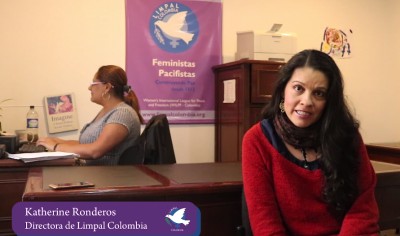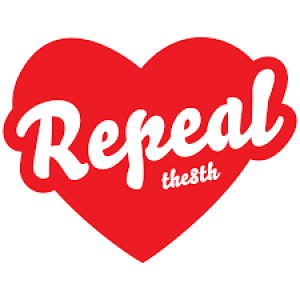Engender blog
GUEST POST: Abortion Legislation in Latin America
Belén González Leggire is an Uruguayan journalist with a master's degree in gender studies and public policy. She was born in Montevideo, and is been living in Edinburgh since 2017. The topics she has investigated over the past years have included sexual violence against women during military coups and the design of social care services in Europe and South America. She is a member of WomenBeing, a research network for the promotion of gender studies.
Here, she writes about abortion legislation in Latin America, where women can be sent to prison for illegally terminating a pregnancy or even for suffering a spontaneous miscarriage.
-400.png)
2018 was yet another year with much to think about for the feminist. In May, Ireland finally repealed the Eighth Amendment, a subsection of their 1983 Constitution that gave the equal right to life of the pregnant woman and the fetus. This cruel law has made termination illegal in the country for the last 35 years. Simultaneously, in South America, Argentina had the chance to join the small group of countries in the region which legalise abortion. Unfortunately, this did not happen. And despite the “#EleNão” (#NotHim) campaign - a social media movement of women rallying against inequality and the election of Far Right a presidential candidate - Jair Bolsonaro won the elections in Brazil, resulting in the country giving the far right more power in the region as a whole.
Abortion Rights in Colombia

This week we hosted an event exploring abortion rights around the world, as part of the Edinburgh World Justice Festival. At this event, we were really pleased to be able to share this short video from sisters in Colombia working for abortion rights.
The video was made as a result of the work of Anne Scott (1951 - 2018), who was a long-term member of Engender, of Abortion Rights Edinburgh, and of the Women's International League for Peace and Freedom (WILPF). Anne had been in contact with WILPF in Colombia and asked them to produce an article discussing the situation there. The article, discussing really exciting community initiatives for abortion rights, can be accessed here.
The article and video is a fitting tribute to Anne, who is much missed by us all.
Scotland in solidarity with Northern Ireland
Engender's Emma Trottier & Alys Mumford set out why it's so important that Scottish MPs take action for Northern Irish women.
Abortion rights in Northern Ireland
Imagine two women; one lives in Belfast; the other in Edinburgh. Both women have decided to terminate their pregnancy. The one in Edinburgh is covered by the 1967 Abortion Act. She’ll need to seek approval from two doctors before proceeding, and has other barriers to overcome, but she has access to a safe and legal abortion. For the woman in Northern Ireland, the situation is one of the worst in the western world. The abortion law dates to 1861, so it’s hardly surprising that terminations are heavily restricted: an abortion is only available if there is a serious, permanent or long-term risk to the life or health of the woman. For the woman in Belfast, a termination will involve extensive planning and travelling, as well as emotional and financial costs. As she cannot exercise her reproductive rights at home, she will have to leave and travel across the sea to terminate her pregnancy, purchase illegal medicine online, or continue with an unwanted or unviable pregnancy.
A referendum in Northern Ireland isn’t the answer to free, safe and legal abortion
Emma Trottier, Engender's Policy and Parliamentary Manager sets out why Northern Ireland doesn’t need a referendum to realise women’s reproductive rights; it needs Westminster to take action.

The images of the Yes campaign in Ireland are still imprinted in my mind: pictures of women campaigning under banners of “Together for Yes”; the bold white “REPEAL” letters on black jumpers; the red heart emblazoned with “Repeal the 8th”; and #hometovote. It was only last week that the Yes campaign won, but it already feels like an age. Almost as soon as the last constituency results were announced, our collective gaze shifted north to focus on the punitive, regressive law that remains in place in Northern Ireland. While mainstream attention to the abortion law in Northern Ireland is long overdue, confusion has set in over how women’s reproductive rights can be realised in Northern Ireland.
Reflections on #RepealThe8th

At the start of the month, I was lucky enough to travel to Ireland with several other women from Scotland to lend a hand with the campaign to Repeal the 8th amendment and allow women to access abortion in Ireland.
It was an amazing weekend and the campaign feels so positive – on our first day we joined 175 volunteers delivering leaflets across Dublin. With one week to go until the referendum, I’ve written a few thoughts about my time there.
Downloads
 Engender Briefing: Pension Credit Entitlement Changes
From 15 May 2019, new changes will be introduced which will require couples where one partner has reached state pension age and one has not (‘mixed age couples’) to claim universal credit (UC) instead of Pension Credit.
Engender Briefing: Pension Credit Entitlement Changes
From 15 May 2019, new changes will be introduced which will require couples where one partner has reached state pension age and one has not (‘mixed age couples’) to claim universal credit (UC) instead of Pension Credit.
 Engender Parliamentary Briefing: Condemnation of Misogyny, Racism, Harassment and Sexism
Engender welcomes this Scottish Parliament Debate on Condemnation of Misogyny, Racism, Harassment and Sexism and the opportunity to raise awareness of the ways in which women in Scotland’s inequality contributes to gender-based violence.
Engender Parliamentary Briefing: Condemnation of Misogyny, Racism, Harassment and Sexism
Engender welcomes this Scottish Parliament Debate on Condemnation of Misogyny, Racism, Harassment and Sexism and the opportunity to raise awareness of the ways in which women in Scotland’s inequality contributes to gender-based violence.
 Gender Matters in Social Security: Individual Payments of Universal Credit
A paper calling on the Scottish Government to automatically split payments of Universal Credit between couples, once this power is devolved to the Scottish Parliament.
Gender Matters in Social Security: Individual Payments of Universal Credit
A paper calling on the Scottish Government to automatically split payments of Universal Credit between couples, once this power is devolved to the Scottish Parliament.
 Gender Matters Manifesto: Twenty for 2016
This manifesto sets out measures that, with political will, can be taken over the next parliamentary term in pursuit of these goals.
Gender Matters Manifesto: Twenty for 2016
This manifesto sets out measures that, with political will, can be taken over the next parliamentary term in pursuit of these goals.
 Scottish NGO Briefing for UN Special Rapporteur on Violence Against Women
Joint briefing paper for the UN Rapporteur on Violence Against Women.
Scottish NGO Briefing for UN Special Rapporteur on Violence Against Women
Joint briefing paper for the UN Rapporteur on Violence Against Women.

Newsletter
Sign up to receive our newsletter here:
Sign up to our mailing list
Receive key feminist updates direct to your inbox: